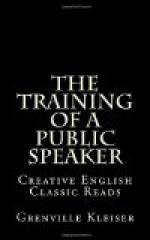There is a great diversity in the use of words. Harsh words best express things of an atrocious nature. In general, the best of simple words are believed to be such as sound loudest in exclamation, or sweetest in a pleasing strain. Modest words will ever be preferred to those that must offend a chaste ear, and no polite discourse ever makes allowance for a filthy or sordid expression. Magnificent, noble, and sublime words are to be estimated by their congruity with the subject; for what is magnificent in one place, swells into bombast in another; and what is low in a grand matter, may be proper in a humble situation. As in a splendid style a low word must be very much out of place and, as it were, a blemish to it, so a sublime and pompous expression is unsuited to a subject that is plain and familiar, and therefore must be reputed corrupt, because it raises that which ought to find favor through its native simplicity.
THE MANNER OF DELIVERY
I shall pass now to the construction of words, observing that their ornamental use may be considered from two points of view; first, as it regards the elocution we conceive in our minds; second, the manner of expressing it. It is of particular consequence that we should be clear as to what ought to be amplified or diminished; whether we are to speak with heat or moderation; in a florid or austere style; in a copious or concise manner; in words of bitter invective, or in those showing placid and gentle disposition; with magnificence or plainness; gravity or politeness. Besides which it is equally important to know what metaphors, what figures, what thoughts, what manner, what disposition, are best suited for effecting our purpose.
FAULTS OF EXPRESSION TO AVOID
In speaking of the ornaments of a discourse, it may not be amiss to touch first upon qualities contrary to them, because the principal perfection consists in being free from faults. We, therefore, must not expect ornament that is not probable, in a discourse. Cicero calls that kind of ornament probable which is not more nor less than it ought to be. Not that it should not appear neat and polished, for this is a part of ornament, but because too much in anything is always a fault. He would have authority and weight in words, and thoughts that are sensible, or conformable to the opinions and manners of men. These inviolably retained and adhered to, he makes ample allowance for whatever else may contribute to illustrate a discourse. And thus it is that metaphors, superlatives, epithets, compound, and synonymous words, if they seem to express the action and fully represent things, seldom fail to please.




